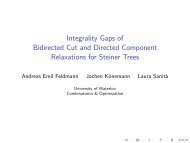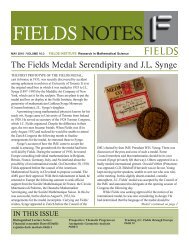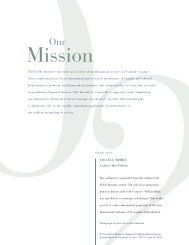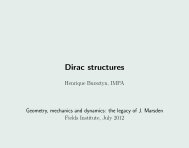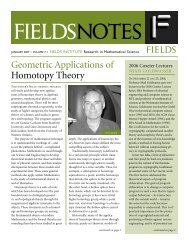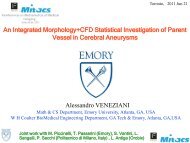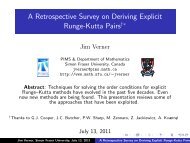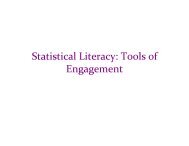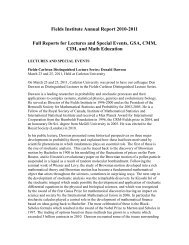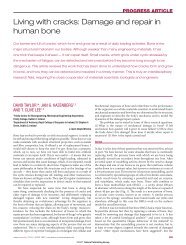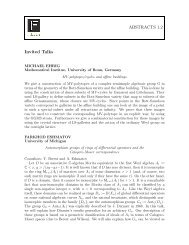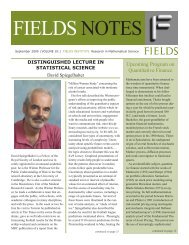Annual Report 2005 - Fields Institute - University of Toronto
Annual Report 2005 - Fields Institute - University of Toronto
Annual Report 2005 - Fields Institute - University of Toronto
You also want an ePaper? Increase the reach of your titles
YUMPU automatically turns print PDFs into web optimized ePapers that Google loves.
ment returns. The object <strong>of</strong> the research was to construct<br />
portfolios <strong>of</strong> investments which can insulate investors<br />
from risk to the economy and provide superior, sustainable<br />
returns.<br />
“Investors and institutions such as pension funds are<br />
looking for alternatives to exposure to the economy and<br />
will want positive returns with investment pr<strong>of</strong>iles not<br />
dependent on economic growth. Sigma’s detailed research<br />
permits us to deliver that product,” comments David Rudd.<br />
Sigma has two basic business themes: 1) providing investment<br />
consulting services to large financial institutions in<br />
Canada, the U.S., and South America; 2) acting as sub advisor<br />
to firms who wish to invest in global structured product<br />
and alternative investments. Sigma has seven full-time staff<br />
including four senior math researchers and is now registered<br />
as an investment counsellor.<br />
The Individual Finance and Insurance Decisions (IFID)<br />
Centre @ the <strong>Fields</strong> <strong>Institute</strong><br />
The Individual Finance and Insurance Decisions Centre<br />
(IFID) is a non-pr<strong>of</strong>it corporation that is currently housed<br />
at the <strong>Fields</strong> <strong>Institute</strong> and is closely associated with the<br />
Schulich School <strong>of</strong> Business at York <strong>University</strong> in <strong>Toronto</strong>.<br />
The broad objectives <strong>of</strong> The IFID Centre are to conduct and<br />
disseminate applied research in the field <strong>of</strong> financial risk<br />
management for individuals. This mandate covers the areas<br />
<strong>of</strong> finance, insurance, economics, actuarial science, taxation,<br />
operations research, law, psychology, sociology and<br />
marketing, ins<strong>of</strong>ar as they apply to individual consumers<br />
and their financial decisions. The IFID Centre has two primary<br />
and ongoing activities. The first is to link and support<br />
a wide network <strong>of</strong> academic researchers interested in the<br />
topic <strong>of</strong> personal finance and insurance. The second is to<br />
engage in quantitatively-based contract work for industry<br />
and government. The IFID Centre is supported by a variety<br />
<strong>of</strong> sponsors that provide funding for targeted research projects,<br />
graduate and postdoctoral fellowships, and an annual<br />
conference devoted to personal risk management. The IFID<br />
Centre’s organizational structure consists <strong>of</strong> an Executive<br />
Director, a governing board <strong>of</strong> directors, in-house support<br />
staff, and research associates from industry and academia.<br />
The current executive director <strong>of</strong> The IFID Centre is Moshe<br />
A. Milevsky, Associate Pr<strong>of</strong>essor <strong>of</strong> Finance at the Schulich<br />
School <strong>of</strong> Business at York <strong>University</strong>.<br />
C o m m e r c i a l / I n d u s t r i a l M a t h e m a t i c s<br />
Moshe Milvesky<br />
<strong>Fields</strong> <strong>Institute</strong> <strong>2005</strong> ANNUAL REPORT 113



